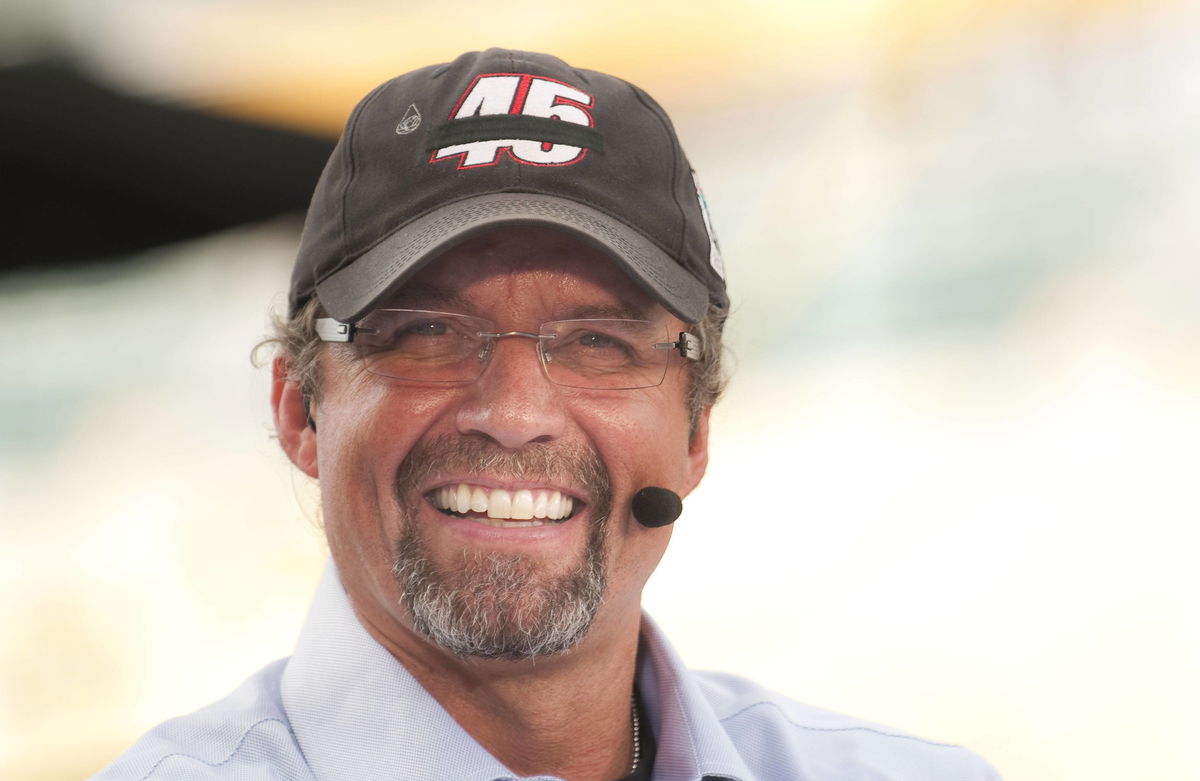
Imago
Nov 22, 2009 – Homestead, Florida, United States – Former NASCAR driver KYLE PETTY on the set of the Speed network at the Homestead-Miami Speedway Nascar Sprint Cup Series Ford 400 race in Homestead PUBLICATIONxINxGERxSUIxAUTxONLY – ZUMAzm1

Imago
Nov 22, 2009 – Homestead, Florida, United States – Former NASCAR driver KYLE PETTY on the set of the Speed network at the Homestead-Miami Speedway Nascar Sprint Cup Series Ford 400 race in Homestead PUBLICATIONxINxGERxSUIxAUTxONLY – ZUMAzm1

Imago
Nov 22, 2009 – Homestead, Florida, United States – Former NASCAR driver KYLE PETTY on the set of the Speed network at the Homestead-Miami Speedway Nascar Sprint Cup Series Ford 400 race in Homestead PUBLICATIONxINxGERxSUIxAUTxONLY – ZUMAzm1

Imago
Nov 22, 2009 – Homestead, Florida, United States – Former NASCAR driver KYLE PETTY on the set of the Speed network at the Homestead-Miami Speedway Nascar Sprint Cup Series Ford 400 race in Homestead PUBLICATIONxINxGERxSUIxAUTxONLY – ZUMAzm1
In more than half a century in racing, Kyle Petty has worn more hats than you’d find in a haberdashery (a.k.a. a hat store).
Watch What’s Trending Now!
The Randleman, North Carolina native has a resume that no one in NASCAR can equal. He’s a veteran NASCAR analyst and unofficial historian of the sport; a radio, TV and podcast host; an actor; author (“Swerve or Die: Life at My Speed in the First Family of NASCAR Racing” – published in 2022); guitar player; songwriter; country music recording artist; philanthropist; charity founder; has crisscrossed the country nearly 30 times on his motorcycle to raise money for charity; made over 850 NASCAR starts as a race car driver; made a dozen sports car race starts (mostly in the Rolex 24 Hours of Daytona); is a father of six and grandfather of six as well; and is one of four children – and the only son – of NASCAR’s greatest and winningest driver, Richard Petty.
The younger Petty is an open book with so many chapters that once you start delving into his story, you can’t put it down. He’s outspoken and can be controversial at times – but he tells things as they are, seemingly never at a loss for words or a perspective that makes people think. While he’s one of NASCAR’s biggest supporters, he also isn’t afraid to call out things he feels are wrong.
That’s why the 65-year-old Petty, with his signature ponytail and an almost constant smile on his face, is such a fan favorite for his honesty, transparency, and good-natured personality. Fans know that when Petty speaks, he’s going to give them the full story – and they respect and appreciate him for that.
With all that Petty has done in his life, he could easily be called NASCAR’s Renaissance Man. Petty was kind enough to spend nearly an hour recently with EssentiallySports.com in a wide-ranging interview that covered his life and what makes him the person he is. Here are some excerpts from that exclusive interview:
Q) How does Kyle Petty describe himself?
A) “This started a long time ago. If you go back to the first cars I drove (for Petty Enterprises), and then the Wood Brothers and then for Felix (Sabates), if you look above the (driver’s side) door, all it said was, ‘Kyle,’ that’s it. Even when I first got on Twitter a thousand years ago, it just said Kyle, nothing more (it’s now @KylePetty). And so that’s how I describe myself. I’m just Kyle.
“I grew up with my dad going to races. I grew up working on race cars. Then I got to drive race cars. Then I get to talk about race cars. And that’s always been the center of the universe. Everything else kind of revolves around that.
“But that’s all I really ever wanted to do. All the other stuff, I’ve just been blessed and had an opportunity to do things because of what I did because of that center of the universe. So I’m just Kyle, man, that’s all.”
Q) Looking back at your racing career, is there one or two things that maybe best defines you, what Kyle Petty was like behind the wheel?
A) “That’s a good question. I was very fortunate to grow up as Richard Petty’s son. Very fortunate to race against Mark Martin, and Dale Earnhardt Sr., and Rusty Wallace, and Terry Labonte and Bobby Labonte, Dale Jr., Jeff Gordon and Jimmy Johnson and all these guys. I’ve had that unique perspective to watch all these guys from apretty dang good seat on the racetrack.
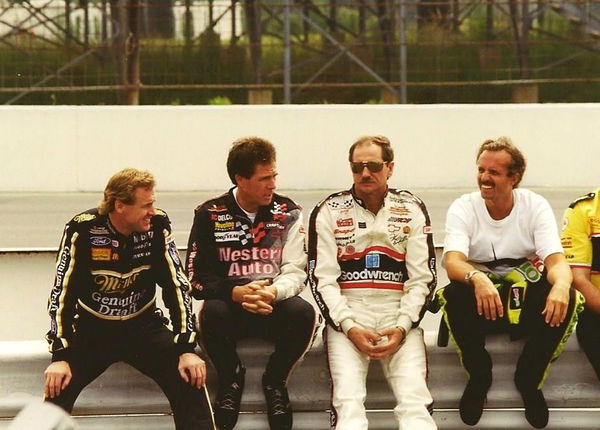
Imago
Rusty Wallace, Darrell Waltrip, Dale Earnhardt & Kyle Petty at Pocono. Credits: @Basso488/X
“And at the same time, growing up with my dad and to understand how great he was and what he could do and watch the things he did. And then to grow up with my grandfather Lee, who talked constantly about the old days.
“So it is that unique perspective of watching David Pearson and watching Bobby Allison and watching Cale Yarborough. And then in the end, watching Joey Logano and Kyle Larson and guys like that.”
Q) You had a lengthy racing career, 30 years and over 850 combined starts in NASCAR. How would you describe yourself as a race car driver?
A) “I was never a great race car driver, and I can say that wholeheartedly honestly. I won some races, I ran upfront some, had a chance at running up in the points and having shots at championships a couple of times.
“But in the end, when you look back, I just had a bunch of top 10s, a few top fives, and won a few races. That’s it, and you just fly along. I just was a journeyman guy, that’s kind of the way I look at my career.
“I had some bright moments. Winning for the Wood Brothers at Charlotte (1987 Coca-Cola 600) was a huge moment for me because they had been so successful there. And then winning that first race for Felix (Sabates) at Rockingham (1990) was a big moment.
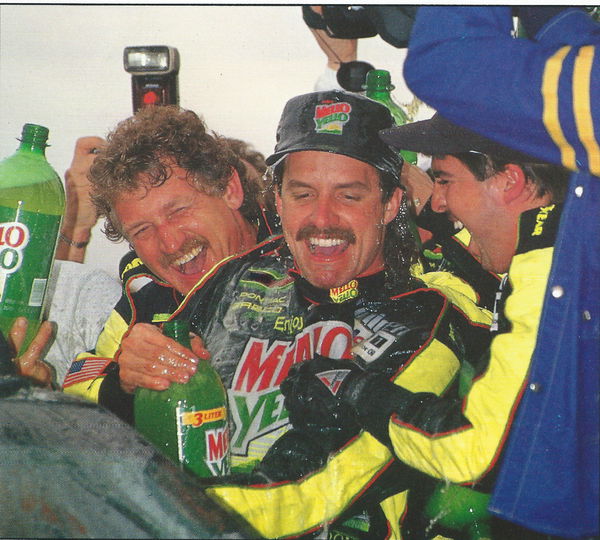
“And then for me, winning at Watkins Glen because I love road courses. That was a big deal. So I think there’s been moments that I look at, but they don’t stand out in the sport.
“It’s not the Daytona 500, the Brickyard, it’s not races like that. The Coke 600 was as close as it comes to it. But I’m just a journeyman guy, man. I was just there and a witness to a lot of history and was a part of a few things that happened in history, like One Hot Night in Charlotte, the first race under the lights (1992 NASCAR All-Star Race), and stuff like that. So I’m a little bit of a footnote, more so than the main story.”
GROWING UP WITH A LEGENDARY FATHER AND SURNAME
Q) What was it like growing up with your father, Richard, and your grandfather, Lee? You couldn’t have gotten a better education of what racing was like.
A) “For us, (racing) was normal. Our normal was to go to Daytona or Riverside or Wilkesboro, Bristol, Martinsville, Charlotte, and other places. That was normal. Other kids stayed at home and went to ball games and went to church on Sunday morning, and did the normal things and civilian things. We always called them civilians. On the weekends, we were beating it up and down the highway, and that was our normal.
“One of my sisters and I were at a wedding recently and talked about how we never went to weddings when we were young because we were always gone. Or like how people mow their own yard. Our yard just mysteriously got mowed while we were gone because we were always gone. That was the kind of way it was.
“I also grew up with my granddad Lee. Obviously, he came along in the 50s, and you know, even in the 60s and 70s when I was a kid. Buck Baker was still around. So many guys were still around. I was fortunate. I grew up with (David) Pearson’s kids and then grew up with the Wood Brothers, and Davey and Clifford and all the Allisons.
“So we didn’t think anything of it. Our dads just drove race cars. And I had a normal childhood because I was hanging out with other race kids and that’s just the way it was.”
Q) Your dad was gone so much, but when he was home, family was always No. 1, right?
A) “When he was at home, he spent time with my sisters and me. We played basketball in the backyard and threw baseballs and stuff. It was just normal stuff. He got up and went to work every morning at the race shop, and he’d come home every night just like any other father would do.”
Q) Was there one person other than your father or grandfather that made the biggest influence upon you?
A) “Leonard Wood. We were Petty Enterprises and we’d race the Wood Brothers and David Pearson, but the guy building the engines and calling the shots and doing the stuff was Leonard Wood. And then when I had a chance to work with him, I realized how smart he was. I’ve said it a million times, bumper to bumper, he was the smartest man I ever knew in my life. He had a huge influence on me, on how he approached racing and how he approached the cars and how he approached different things.
“I also watched drivers like Pearson and Bobby Isaac and got to hang out with guys like Harry Hyde and Harry Lee, his son. We were in the garage, and everybody was talking, and you heard their stories, and then you lived long enough that you could tell their stories. It’s important for people today to hear their stories because those are the guys that built us.”
KYLE THE NASCAR HISTORIAN
Q) Why do fans like you and your opinions so much? You definitely relate to them and vice-versa.
A) “I think NASCAR fans are some of the most educated fans of any sport that’s played. I don’t care whether it’s European soccer, football, cricket, or baseball. Most fans have knowledge, but they don’t have a context in which to put the knowledge. They’ve never worked on a race car, they never ran a race as a crew chief, never drove a race as a driver, so you’re using black and white knowledge off the page without practical experience. It’s always going to be that way.
“My scope of the sport goes back to the late ‘60s with my dad. I saw Dan Gurney run at Riverside. There’s not a lot of people walking around who can say they saw Gurney run and win at Riverside in ’68. I saw him drive the number 121 for the Wood Brothers, a three-digit car, and that just freaked me out when I was a kid because I’d never seen three numbers on the side of a Cup car. So I can sit here and say I saw Gurney run Riverside and I saw Kyle Larson win the 2025 championship, and in between.”
Q) What are some other things you remember and do they impact things you say on-air?
A) “I remember stuff from the 70s, and I was on my dad’s pit crew when I was 14 years old, carrying tires in 1974, on pit road working every weekend. When you ask me a question, I’m gonna give you my answer and you may not like it. You don’t have to like it because it’s just my answer, and it’s just my opinion, and you may have a totally different one, but I try to understand that your opinion is coming from this angle, and my opinion is coming from this thing. I’m not gonna sugarcoat it because our fans are smart enough to know that if you’re BS-ing them, they’ll call you on it because they know enough about what’s going on.”
WHY CHARITY AND GIVING BACK IN SON ADAM’S MEMORY IS SO IMPORTANT TO HIM
Q) Charity work is so important to you. Next year will be the 30 edition of the Kyle Petty Charity Ride Across America (May 1-9, starts at Sonoma Raceway in California and will finish at Charlotte Motor Speedway). And of course you were one of the founders of Victory Junction Gang Camp in memory of your son, Adam, who was tragically killed in a crash while practicing at New Hampshire Motor Speedway in 2000. Those kinds of involvement drive you to give back so much to the racingcommunity, particularly Victory Junction, which hosts kids that suffer from serious or chronic medical conditions and don’t have opportunities other children have. Can you talk about the personal satisfaction you get giving back so much to others?
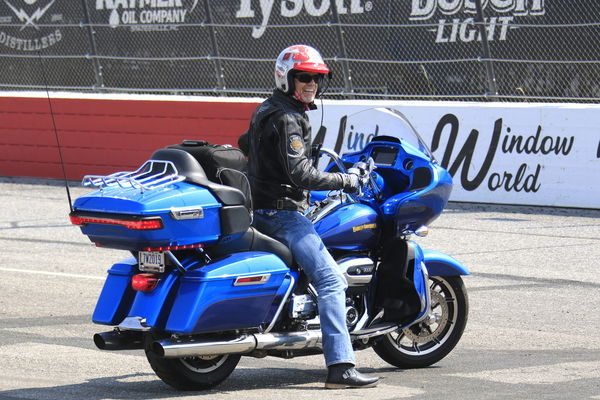
Imago
NORTH WILKESBORO, NC – MAY 21: Kyle Petty enjoys a laugh while watching the Kyle Pettys Charity Ride Across America making a lap around the Speedway prior to the running of the NASCAR, Motorsport, USA Cup Series All-Star Open on May 21, 2023 at North Wilkesboro Speedway in North Wilkesboro, NC. Photo by Jeff Robinson/Icon Sportswire AUTO: MAY 21 NASCAR Cup Series All-Star Race EDITORIAL USE ONLY Icon230521193
A) “I grew up in a rural North Carolina where everybody helped everybody and that’s just the way it was. We had a race shop and it was nothing where we’d be working on a race car and a local farmer would come up and he’d broken his plow. They’d pull the welder out in the parking lot and weld up his tractor or weld up his plow or hay rake or whatever. Everybody just helped everybody.
“We had a community ballpark and my dad and my grandmother bought uniforms for the baseball teams for the local Little League team and the Pony League team. And at Christmas, my mom always would just fill the back of a station wagon with gifts and stuff that she would wrap and take to different families around just so they had something. The point was that we were very blessed with what we had so you shared with everybody else. And at the same time, the guy that you welded up his tractor, his wife would bake a pie and bring it by the house so they would share what they had with you.
“I tell people we were very blessed that God put us on earth to ride around in circles and that’s all we ever did, that’s all my Granddad did, that’s all my dad did, that’s all I ever did. And if we were fortunate enough to do that, we should use that as a platform to go do something else. We built Victory Junction and that’s how the camp came about because Adam wanted to build a camp.
“I think a lot of times God reaches down and says, ‘Okay, I’m gonna push you in this direction’ and you don’t even realize you’re being pointed in that direction until something happens and it’s like, ‘That’s why (God) put us here.’ My dad’s got 200 trophies from winning races and seven championship rings, but there’s been 136,000 families and kids that have come through Victory Junction and when you look at that and weigh a trophy against a family or a trophy against a kid, then you know one child is worth 200 trophies times a million. That’s just the way it is and I think that’s the way (Richard) looks at it. He’s incredibly proud of what the camp has become and what it is now and I think Adam would be too. And the motorcycle ride, we ride to send kids to camp and we’ll keep doing that as long as we can.”
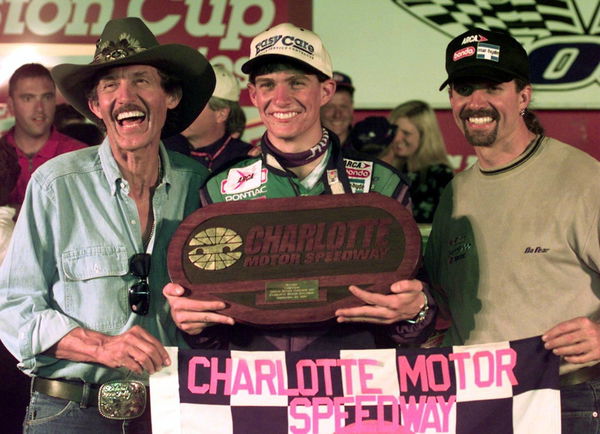
Imago
Sept. 29, 1998 – U.S. – KRT SPORTS STORY SLUGGED: PETTY-OBIT KRT FILE PHOTO BY JEFF SINER/CHARLOTTE OBSERVER (KRT9 – May 12) Adam Petty, center, is shown with his grandfather, racing legend Richard Petty, left, and his father, NASCAR Motorsport USA driver Kyle Petty, right, after winning the Easy care 100 race September 29, 1998 at the Charlotte Motor Speedway. Adam, the youngest in the racing clan, was killed Friday, May 12, 2000 in a crash in Concord, New Hampshire. (CH) AP PL KD 2000 (Horiz) (gsb) News Archive – Sept. 29, 1998 – ZUMAm67
Q) Adam would be 44 now if not for his tragic accident. He probably would be near the end of his Cup career around now. What kind of Cup driver would he have made?
A) “I thought he had tons of potential. I thought he was going to be just phenomenal, but it just wasn’t meant to be the way it played out. I’ve never looked back to try to look forward because I see him the way he was. He was a talent. I don’t know what kind of racer he would be and would never speculate because that’s the way and we’ve always looked this way.”
Q) Let’s talk about some of your non-racing involvement. You and several pro motorcycle racers recently became involved with a unique program where more than a dozen students at LaVergne High School near Nashville are spending the current school year building a flat track racing motorcycle, along with Northern Tool + Equipment. Once the bike is finished, it’ll be revealed next June and raced at Tennessee National Raceway. Can you talk about the program?
A) “My dad’s done a similar project for a couple of years, but he told me ‘I don’t know anything about motorcycles’ and (asked Kyle to be involved, given his long history of riding motorcycles). It’s really phenomenal. These kids are so excited and you’re giving these kids a trade, teaching them how to use their hands. Like my dad says, ‘If you teach a kid to use his hands, he’ll never be out of work.’ I’m really excited about watching the progress as they go through it. It’s just a cool program that honestly can change these kids’ lives. You can keep track of the progress on YouTube.”
HOW DOES HE ANALYZE THE WAY THIS SEASON’S FINALE AND CUP CHAMPIONSHIP PLAYED OUT?
Q) What were your thoughts about this season’s final race, when Denny (Hamlin) fell short and Kyle Larson won the championship?
A) “It’s just racing, man. That’s the beauty of sports, that we have an emotional connection to the sport, we have an emotional connection to Denny Hamlin or Kyle Larson or William Byron. All four (Championship Four drivers) went into this race knowing what they needed to do. You didn’t have to win the race, you didn’t have to do anything but beat those other three guys.
“That’s the way the format is. Everybody knew that going into Daytona, so don’t complain about it, don’t whine about it now or don’t whine that you didn’t make the playoffs. You knew the rules when we showed up at Daytona, and we’re not changing the format in the middle.
“From a strictly emotional standpoint, you’re crushed for Denny Hamlin, and it hurts your heart because I’ve said it said it a million times and I’ll say it until somebody proves me wrong. I honestly believe that he’s the last Cup driver that we’re going to see get to 60 wins because I just think these other guys like Kyle Larson, William Byron and Christopher Bell, they’re just going to take wins from each other. They’re going to get their four or five (wins) a year but they’re already in their early 30s and that’s just not going to get them to 60 wins.
“As I look at it, you’re crushed for Denny, but at the same time, you’re elated for Kyle Larson because he had a snowball’s chance of winning that thing. Denny just got caught in a bad place on the racetrack and that’s strictly racing. There was nothing he could do and so you chalk it up to racing, man. He had a phenomenal race so you hurt for him, but then if you take the emotion out of it and take the names out of it, it was a great performance by Denny that came up short and it was a Hail Mary by Kyle Larson that won the thing.”
Q) What are your thoughts about the likely changes to the playoff format for next season?
A) “It really makes no difference. I think we focus too much on things like this, and I say that because Richard Petty won seven championships under five different point systems. So no matter what you throw out there as a point system or a way of getting there, I’m not going to say a hundred percent of the time but I’m going to tell you about 96-97 percent of the time, the cream is going to rise and the guy that wins the thing is going to be the guy that would have won it no matter what.
“The guys that are fighting for it are guys that deserve to fight for it, so I don’t care. It fascinates me that fans can get a bee in their bonnet and think they’re right, no matter what. You just can’t reason with them, so the thing is just throw something out there, let’s run with it. I applaud NASCAR and always have on their willingness to at least listen and be willing to make a change if they think it’s for the better. It’s their game, it’s their rules, and we play under it.”
FAMILY AND RACING ARE MOST IMPORTANT IN HIS LIFE, BUT A CLOSE THIRD IS HIS LOVE OF MUSIC
If he hadn’t been a race car driver, Kyle potentially could have had a career in music, particularly country music.
RCA Records signed him to a recording contract in 1986, with a lone single titled “The Other Guy” that led to him serving as an opening act in several concerts for stars such as The Oak Ridge Boys and Randy Travis, and a guest shot on the popular Hee Haw TV show.
He also recorded an homage to his famous father, “Oh King Richard” in 1995. The following year, Kyle received his own homage when the rock group Soundgarden released a song titled “Kyle Petty: Son of Richard.”
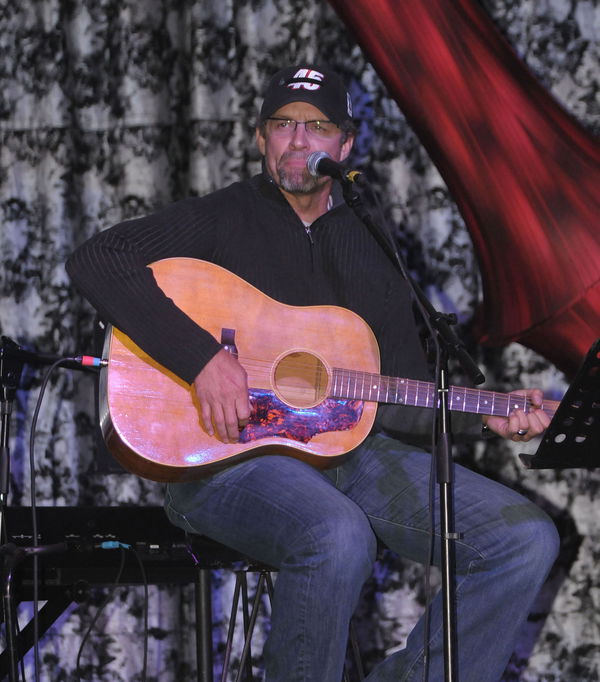
Imago
Kyle Petty Fire and Ice to celebrate the launch of the Fort Lauderdale boat parade held at the Seminole Hard Rock hotel and casino Hollywood, Florida – 12.12.08, United States WENN 2217322.jpg
Q) Let’s talk a bit about Kyle Petty, the singer, songwriter and guitar player. Tell me about your musical side?
A) “Music’s always been a part of (his life). When I went to drive for the Wood Brothers, I was doing music and (performing in) Nashville and stuff, so I’ve always dabbled in it. I laugh about it because people would make a big deal out of it, like you need to focus on racing and not be doing it, but to me, it was always just a hobby; it was something fun to do.
“When I was in high school, I played saxophone in the high school band. I played football, basketball, baseball and was still in the band too because I love music. That’s just part of who I am. I (still perform) every now and then and still mess around. If somebody calls and says, ‘Hey, you want to come do this? I’m like, yeah, I’m in dude, I’ll go do it anytime (he adds with a laugh).’
“I tell people when you drive a race car and you make a mistake, you get an ambulance ride. But when you play music and you make a mistake, you just keep going and nobody cares and you don’t get an ambulance ride. So it’s a lot safer playing music than it is doing the race car thing.”
Q) You’ve always been such an open book throughout your racing and broadcasting career. Tell us something that people don’t know about Kyle Petty?
A) “I honestly don’t think there’s much that people don’t know. I run across people that know moreabout me than I know myself because they’ll start talking about, ‘Well, I saw you here and you did this’,and I’m like, ‘Man, I didn’t even remember I did that,’ and then they’ll show me a picture and I’m like, ‘Yeah, I guess I did it.’”
Q) What was one of the wildest things you ever did?
A) “I tell people this in a joking way but it’s the truth. It was 10, 15 years ago and Eddie Gossage was running Texas Motor Speedway. He had the No Limits Garage and one year they had bull riding. So I told him I wanted to ride a bull and he let me ride a bull. I was only on the thing for about a second. I’m not even sure I made it another second. But at least I tried. The bull threw me off.
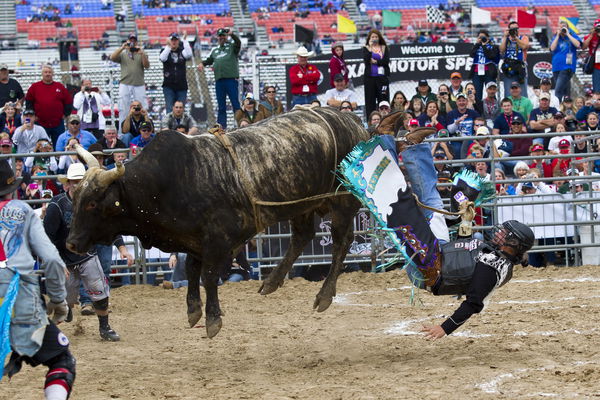
Imago
FORT WORTH, TX – NOV 06, 2011: Kyle Petty rides a bull for .8 seconds before the AAA Texas 500 race at the Texas Motor Speedway in Fort Worth, TX. Copyright: xCrystalxAlisonxMacleodx
“Other things I’ve done, I flew around the world on the Concorde one time. I’ve just done crazy things. I tell people this all the time, and this is one thing I don’t think people completely understand, is I don’t want to be that guy in the nursing home when I’m 100 years old who says I had a chance to do that one time and I never did it. I want to be that guy that said I wasn’t good and I wasn’t successful, but by God I gave it a shot! I just want to be that guy that just has all the goofy stories.”
WHAT’S THE NEXT CHAPTER FOR KYLE PETTY?
Q) Is there anything left on your bucket list that you still want to do?
A) “I still want to ride a motorcycle on the wall of death, where they have the barrel and you ride inside. And Matt Kenseth and I have talked for years about riding to Alaska on a motorcycle and back home. There’s things like that I still want to do that are out there that I don’t think are crazy. Other people have done it. I’m not always the first guy to do it, but I don’t mind being the second or third guy to give it a shot.”
Q) You’re now 65. How much longer do you plan to continue doing all that you’re doing? Is there another chapter still to be written by you?
A) “I’m the kind of person that I’m going to do this until I die. As long as there’s another day, there’s another again. I go back to being from the rural south and from a rural community, there’s not a farmer that I ever knew that ever stopped farming. He farmed until the day that he couldn’t get on that tractor, he couldn’t go anymore and for most people that I knew, it was the day they passed away. You don’t retire from that, you don’t retire from living the life and doing the things you love.
“You know, my dad’s 88 and he still goes to 25, 26 races a year. He doesn’t have to because he’s Richard Petty, he’s won 200 races, he’s won seven championships, he’s got a great big old house with a big screen TV. He doesn’t have to go to the racetrack, but he goes to the racetrack because that’s who he is and that’s what he enjoys doing.
“For me, I love race people, I love to talk to drivers, I love to talk to guys that work on cars and fans. I just like race people and like being around it, so I’m gonna go where race people are. They keep you young, man, they keep you moving, keep you shuffling, keep you thinking. So yeah, I’m not gonna retire one day. I’m just gonna fall down and they’re gonna just dig a hole and roll me over in it and then somebody else will take (my) place.”
—————————————————————–
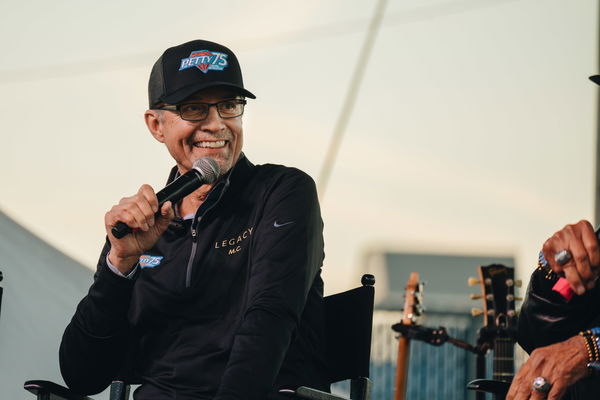
MORE THINGS YOU MAY NOT KNOW ABOUT KYLE PETTY
There is so much more about who Kyle Petty is. Here are additional highlights about the man and his career:
— One week before his father won the 1979 Daytona 500, the first live national telecast of a Cup race, Kyle won in his first official NASCAR race, the 1979 Daytona ARCA 200, at the age of 18. At the time, he was the youngest driver to win a major series stock car race. He drove his father’s old 1978 Dodge Magnum.
— Many kids wear hand-me-down clothes. Kyle began his racing career driving hand-me-down race cars that his legendary father used to drive.
— He made his Cup debut on August 5, 1979, in the 1979 Talladega 500 (finished ninth).
— During his Cup career, he started driving for the family team, Petty Enterprises, followed by Hoss Ellington, Wood Brothers, Felix Sabates, his own team (PE2 Motorsports) and ended his career in 2008 back with Petty Enterprises.
— One of NASCAR’s greatest ironies: of Kyle’s eight career Cup wins, he never won a race for Petty Enterprises. He won two for Wood Brothers and six for Felix Sabates. Three of his wins were at Rockingham, as well as Richmond, Charlotte, Watkins Glen, Pocono and Dover. His first career Cup win was in 1986 at Richmond, while the biggest win of his career was the 1987 Coca-Cola 600 at Charlotte Motor Speedway for the Wood Brothers.
— Competed in 829 Cup races over 30 years. His best season finishes were in 1992 and 1993, when he finished fifth both times in the Cup standings.
— While the 1992 Winston Cup season is best known for Alan Kulwicki edging Bill Elliott for the championship, as well as being Richard Petty’s last Cup race and Jeff Gordon’s first, Kyle was in contention for the championship until his engine broke in the season finale at Atlanta.
— Petty has been an announcer for numerous networks including ESPN, TNT, FOX Sports, SPEED TV and since 2015 with NBC Sports as an analyst on pre- and post-race coverage of the NASCAR Cup and Xfinity Series. He’s also a regular on Performance Racing Network (radio), YouTube, and podcasts, feature shows and numerous guest appearances across several broadcast platforms. He has even broadcast live while driving in a race (Sonoma, 2007).
— Kyle has been married twice and is the father of six: Adam, Austin and Montgomery Lee with first wife Pattie, and Overton, Cotton and David with current wife Morgan. He also has one grandchild.
— Has acted in several films and TV shows, including Stroker Ace, Cars 3 and WCW Monday Nitro.



